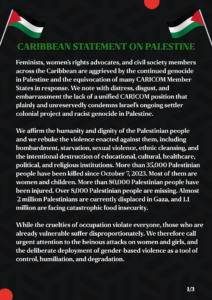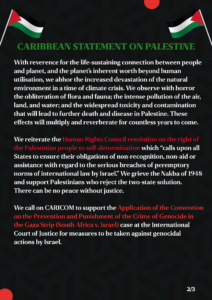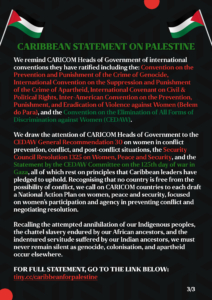The Global 16 Days Campaign started on Monday, November 25, International Day for the Elimination of Violence Against Women (IDEVAW). The campaign opened at a time that the country is shocked and upset by the rape and murder of 12-year-old Adriel Moxey and the rape and death of 72-year-old Verencha Butler.
The Global 16 Days Campaign was started in 1991 by a group of women in activism who had been engaged in a training programme and saw the need to bring specific focus to gender-based violence against women and girls. The 16-day campaign includes key dates such as International Day of Solidarity with the Palestinian People (November 29), International Women Human Rights Defenders Day (November 29), International Day of Persons with Disabilities (December 3), and Human Rights Day (December 10.) In recent years, December 6 has been recognised as Femicide Awareness Day.
Femicide has been a theme in the Global 16 Days Campaign by Equality Bahamas for the past few years, both because it was a multi-year theme for the Global 16 Days Campaign itself and it is an overlooked, under-studied issues in The Bahamas. Femicide is the sex- or gender-based killing of a woman or girl, and it can be direct or indirect. Direct femicide is a killing that results from overt physical violence, and indirect femicide results from discriminatory, oppressive, or negligent action or inaction.
The rape and killing of both Adriel Moxey and Verencha Butler, which took place just days before the start of the Global 16 Days Campaign, are emblematic of the issue of gender-based violence against women and girls which includes sexual violence and at its most extreme, results in femicide.
Adriel Moxey, by all accounts, was a spirited girl who enjoyed being around people and kept herself busy with extracurricular activities. She usually made her way home after her on campus activities and church events. It was expected that she would continue to do so, and that it would be safe for to continue living as she did. On the day she was raped and murdered, she went to school. She attempted to walk home from school. She was interrupted by violence. She, like all survivors and victims of rape and femicide, does not have any blame for what for what was done to her. She was child, and she was trying to find joy and connection, and she was targeted, overpowered, and violated in the ways women and girls are regularly reminded to fear.
Verencha Butler was a mother and grandmother. She spent time with her family, in celebration of a birthday, before returning to her home where she had the reasonable expectation of safety. She likely had a daily and nightly routine. Perhaps she watched the news in the evening. Maybe she enjoyed a cup of tea before going to bed. She may have always had her tea in a particular mug. That night, we can easily imagine that she turned over the memories of the birthday celebration in her mind, smiling at the wonderful engagement she had with her family. Her night was interrupted. She, like all survivors and victims of rape and femicide, does not have any blame for what was done to her. She was an elderly woman, and she was going about life as she usually did, and she was targeted, overpowered, and violence in the ways women and girls and regularly reminded to fear.
Both of these cases are horrific. They fill some of us with terror and other with disgust or confusion. We wonder how anyone could violate a 12-year-old or a 72-year-old in these ways. We have question after question about the circumstances that led to these criminal acts, what went wrong along the way, and what we need to do now. It has only been a few days, and already the temperature is returning to the usual as attention shifts. So limited is the national capacity for outrage and to apply pressure that even the most horrific cases fall away from the headlines, social media discourse, and dinner table discussion.
This year, Equality Bahamas set Rage and (anti-)Resilience as its theme for the Global 16 Days Campaign. The events are creating space for women to feel, acknowledge, and channel our rage into meaningful action for the political and social transformation we need in order to end gender-based violence. The sessions are also challenging the idea that women and girls must be resilient as individuals, being strong, pulling ourselves up by the bootstraps, and bouncing back from adversity, pretending it never happened. Instead, resilience is being framed as system and a network that allows people to recognise our interdependence and build active communities that are spaces and resources for care. The campaign is building on the idea put forward by Soraya Chemaly in her book The Resilience Myth: New Thinking on Grit, Strength, and Growth After Trauma.
We see the harm causes by narrative about a resilience that requires individual strength in the response to the rape and murder of Adriel Moxey. People have been quick to blame her mother, who is also a victim of these crimes, for what happened to her daughter. She should have secured private transportation for her child, she should have looked for her earlier, she should not have fallen asleep, she should have walked to the police station… There is no end to the list of actions she should have taken. Not only is there no blame assigned to the father, whether or not he was present in Adriel’s life, but this shifted attention from the perpetrator. It also makes the assumption that we are all responsible for ourselves and our dependents to the exclusion of everyone else. It suggests that there is no role for community or government to play. It ignores that other factors involved in Adriel’s case, from the lack of electricity in the area of her home and lack of safe public transportation for all students to the realities and perceptions of the police (as demonstrated by more than one person who did not go directly to the police when there were signs of a crisis).
What is resilience is not a one person job that everyone has to do for themselves? What if the village actually functioned like a cohesive unit? What if the Department of Social Services did its job, on every case, every single time? What if the police were trusted, responsive, and effective? What if no child had to walk home alone, whether at the end of the regular school day or after extracurricular activities? What if electricity was provided wherever there are houses? What if mental health were taken seriously and people could access services without stigma and regardless of ability to pay? What if there were sufficient housing for people in crisis?
The failures are systemic. No individual should have the burden of overcoming all of the systemic issues that are not addressed by the government or other power-wielding entities, nor carry the blame when the consequences of the systemic issues result in tragedy. You see the horrible situations. You feel grief when people are raped, physically assaulted, and murdered. You see the pain of their loved ones. You can barely imagine the fear of the people it could have been, and the people it could be next. You know it is tragic that there will be a next time. Still, you are in the safety of your home, your family, your safety net, your bank account, and you tell yourself that you are better than those other people and what happens to them would not happen to you because you are resilient. Because you or your family has done certain kinds of work to protect you. And to further convince yourself of your invulnerability, you blame someone. You make decisions about why events unfolded as they did and what individual actions would have prevented them. You get to be superior and separate from this place where terrible things happen. It is easy to blame.
What if you allow yourself to be enraged? What if your disgust is for perpetrators and the systems that enable them to enact violence? What if your demands of the government extended beyond punishment?
There is very little prevention work taking place in The Bahamas. Punishment is not prevention. Punishment happens after the crime is committed. How many cases of gender-based violence and femicide do there need to be before this administration—any administration—faces the facts?
Gender-based violence is a specific type of violence that disproportionately impacts women and girls. Violence against women and girls is common, and it is rooted in patriarchal attitude, gender stereotypes, and harmful gender ideology that convince people that women are inferior to men. Gender-based violence can result in femicide. The killing of a woman or girl because of her sex or gender is femicide. This is not the same as any other kind of murder or homicide. It is gender-based killing. Cases of femicide must be named and counted. There is no other way to determine the prevalence of the sex- and gender-based killing of women and girls, and there is no other way to determine the risk factors or indicators. Risk factors and indicators are needed in order to development preventative measures and appropriate, effective intervention. There is no ending gender-based violence or femicide without the use of these specific terms, the collection and analysis of data, and the development, planning, and implementation of action plans which must include legal reform and national programming. The Gender-Based Violence bill is, as stated by the CEDAW Committee and recommended by United Nations Member States in the Universal Periodic Review, a requirement for this work. There is no existing law that address gender-based violence specifically and comprehensively, and until there is, we know that we cannot take the Government of The Bahamas seriously and that it is leaving to us, as individuals or as communities—whichever we choose—to be resilient on our own.
Published in The Tribune on November 27, 2024.





